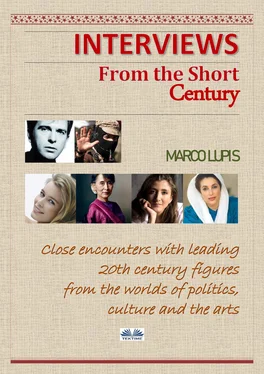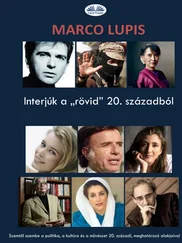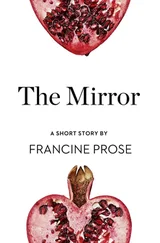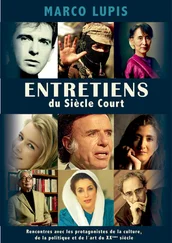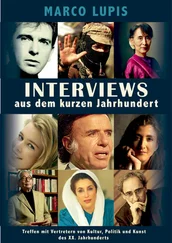Marco Lupis - Interviews From The Short Century
Здесь есть возможность читать онлайн «Marco Lupis - Interviews From The Short Century» — ознакомительный отрывок электронной книги совершенно бесплатно, а после прочтения отрывка купить полную версию. В некоторых случаях можно слушать аудио, скачать через торрент в формате fb2 и присутствует краткое содержание. ISBN: , Жанр: foreign_edu, Биографии и Мемуары, на английском языке. Описание произведения, (предисловие) а так же отзывы посетителей доступны на портале библиотеки ЛибКат.
- Название:Interviews From The Short Century
- Автор:
- Жанр:
- Год:неизвестен
- ISBN:978-8-87-304360-7
- Рейтинг книги:5 / 5. Голосов: 1
-
Избранное:Добавить в избранное
- Отзывы:
-
Ваша оценка:
- 100
- 1
- 2
- 3
- 4
- 5
Interviews From The Short Century: краткое содержание, описание и аннотация
Предлагаем к чтению аннотацию, описание, краткое содержание или предисловие (зависит от того, что написал сам автор книги «Interviews From The Short Century»). Если вы не нашли необходимую информацию о книге — напишите в комментариях, мы постараемся отыскать её.
Interviews From The Short Century — читать онлайн ознакомительный отрывок
Ниже представлен текст книги, разбитый по страницам. Система сохранения места последней прочитанной страницы, позволяет с удобством читать онлайн бесплатно книгу «Interviews From The Short Century», без необходимости каждый раз заново искать на чём Вы остановились. Поставьте закладку, и сможете в любой момент перейти на страницу, на которой закончили чтение.
Интервал:
Закладка:
I think it's because Chinese directors can combine exemplary cinematography with our culture's unique charm and style.
How did you get into acting?
Completely by chance. I loved to sing when I was younger. One day, my singing teacher said I should go with him to watch a TV show being filmed in Shandong. I remember the director was a woman. When she saw me, she decided I had to have a part, so she gave me a copy of the script. It was only a small part, but she decided I was a natural. She said to my mum: âYour daughter must become an actress.â She managed to convince her, and two months later I enrolled at the Central Academy of Drama in Beijing. I studied really hard, started to get small parts and the rest, as they say, is history!
You divide your time between Beijing and Hong Kong. The papers are full of your new relationship with a Hong Kong-based businessman, so do you think you will move there permanently?
I donât think so. I like Hong Kong because itâs bustling and great for shopping. But I find it annoying. Beijing is different. People stop you in the street and talk to you about all sorts. In Hong Kong, itâs all about the money.
Are you fed up with the press sticking their noses into your private life?
I think it comes with the territory really. Itâs mainly the Asian press that often prints unpleasant or made-up stories. The papers in the West have higher standards.
Is it also important for an actress to be beautiful in China?
Do you think Iâm beautiful?
Youâre seen as a sex symbol in the West .
Thatâs really nice, but I don't feel like a sex symbol. Maybe Chinese women have a certain appeal or charm because we are so different to Western women.
What are your plans for the future?
I want to get married and have children. I think family is a really important part of a womanâs life. If you donât have a family, you canât bring experience of everyday life into your work.
And do you have any more films lined up?
Not at the moment. Iâm reading lots of scripts, but none have jumped out at me so far. Iâm not going to accept any old part just for the sake of it.
Would you consider working with a Western director?
If they had a part that was suitable for me as a Chinese woman, sure...why not?
Is there an Italian director youâd like to work with?
Absolutely: Bernardo Bertolucci!
5
Ãngrid Betancourt
The Pasionaria of the Andes
Dina, here is my article with box to follow. I hope you are well.
Today (Monday, February 11), Iâm flying from Tokyo to Buenos Aires, where I will land tomorrow (February 12). You will still be able to reach me on my satellite phone, even while Iâm navigating my away across Antarctica. Iâll be back in Argentina around February 24 and will then head to Bogotá, where I am scheduled to interview Ingrid Betancourt in early March.
Let me know if you'd be interested.
Catch up soon,
Marco
On an old computer, I found this email that I sent in early February 2002 to inform Dina Nascetti, one of my bosses at LâEspresso , of my movements. I had been in Japan to report on the tomb of Jesus [1]and I was preparing to embark on a long journey that would take me far away from home for nearly two months. I was headed for the end of the Earth: Antarctica.
On the way out, I planned to report on the severe economic crisis that was gripping Argentina, and on the way back, I would go via Colombia to interview Ingrid Betancourt Pulecio, the Colombian politician and human rights activist. As it turned out, I arrived in Bogotá a couple of days early, which - for me at any rate - was a stroke of luck. I interviewed Ms Betancourt on February 22, and precisely twenty-four hours later she vanished into thin air while being driven from Florencia to San Vicente del Caguán. She had been kidnapped by FARC (Revolutionary Armed Forces of Colombia) guerrillas and would be held hostage for more than six years.
If Iâd arrived in Colombia just a day later, I never would have met her.
*****
She has shoulder-length brown hair and typically Colombian dark eyes. She wears an amber bracelet on her wrist and rarely cracks a smile.
But then, Ãngrid Betancourt doesnât have many reasons to smile. She may look younger than her forty years and have an enviable petite frame, but she is running for the presidency of Colombia, the most violent country in the world, where ten people are kidnapped and seventy people murdered every single day. Where war has raged for four decades, claiming thirty-seven thousand civilian lives in the last twelve years alone. A country that boasts the dubious honour of being the worldâs leading producer of cocaine. A country from which over a million people have fled in the last three years.
And yet, it is not so long ago that this same woman sat before me today in a heavily guarded, clandestine apartment in downtown Bogotá, wearing a bulletproof vest and a nervous expression, was smiling serenely as she lay on a beach in the Seychelles, where her handsome and sophisticated French diplomat husband had been posted.
Precisely twenty-four hours after the interview, while being driven from Florencia to San Vicente del Caguán, on the front line of the battle between FARC rebels and government forces, Ãngrid Betancourt disappears along with a French photographer and cameraman accompanying her to document an electoral campaign fraught with danger. Everything points to a kidnapping.
A dramatic event which paradoxically, even for a country as pitiless as Colombia, âsuddenly increases the likelihood of her winning the electionâ, Gabriel Marcela, professor at national war college ESDEGUE, knowingly observes.
It was Ms Betancourt's own decision to come back to this hellish place in 1990, aged just thirty and in the prime of her life.
A former member of the Chamber of Representatives she has founded the Oxygen Green Party âin order to bring clean air into the corrupt world of Colombian politicsâ, she explains solemnly. The partyâs slogan reads: â Ãngrid es oxigeno â [Ãngrid is oxygen]. And the campaign poster shows the woman herself with an anti-smog mask and surrounded by coloured balloons. The one hundred and sixty thousand votes she received when she was elected Senator four years ago were the most for any candidate in a Senate election in Colombia. But it could be argued that she wouldn't still be in the headlines without her recently published autobiography, the Italian title of which leaves us in no doubt as to her current frame of mind: Theyâll Probably Kill Me Tomorrow .
I put it to her that this might be a shade melodramatic.
â The French edition was titled La rage au coeur [With Rage in My Heart],â she responds defensively. âBut the Italian publishers wanted a stronger title, so that's what we went for. And actually, thatâs really how Iâm feeling. It's what goes through my head first thing in the morning and last thing at night. I donât think itâs particularly melodramatic. The prospect of being murdered tomorrow is a very real one for millions of this people in this country.â
The French newspapers are portraying her as some kind of latter-day saint: Paris Match called her âThe woman in the firing lineâ, Libération âA heroineâ, Le Figaro âThe Pasionaria of the Andesâ. Le Nouvel Observateur wrote: âif Simon BolÃvar, the liberator of Latin America, could have chosen an heir, he would have chosen herâ.
Читать дальшеИнтервал:
Закладка:
Похожие книги на «Interviews From The Short Century»
Представляем Вашему вниманию похожие книги на «Interviews From The Short Century» списком для выбора. Мы отобрали схожую по названию и смыслу литературу в надежде предоставить читателям больше вариантов отыскать новые, интересные, ещё непрочитанные произведения.
Обсуждение, отзывы о книге «Interviews From The Short Century» и просто собственные мнения читателей. Оставьте ваши комментарии, напишите, что Вы думаете о произведении, его смысле или главных героях. Укажите что конкретно понравилось, а что нет, и почему Вы так считаете.
